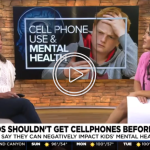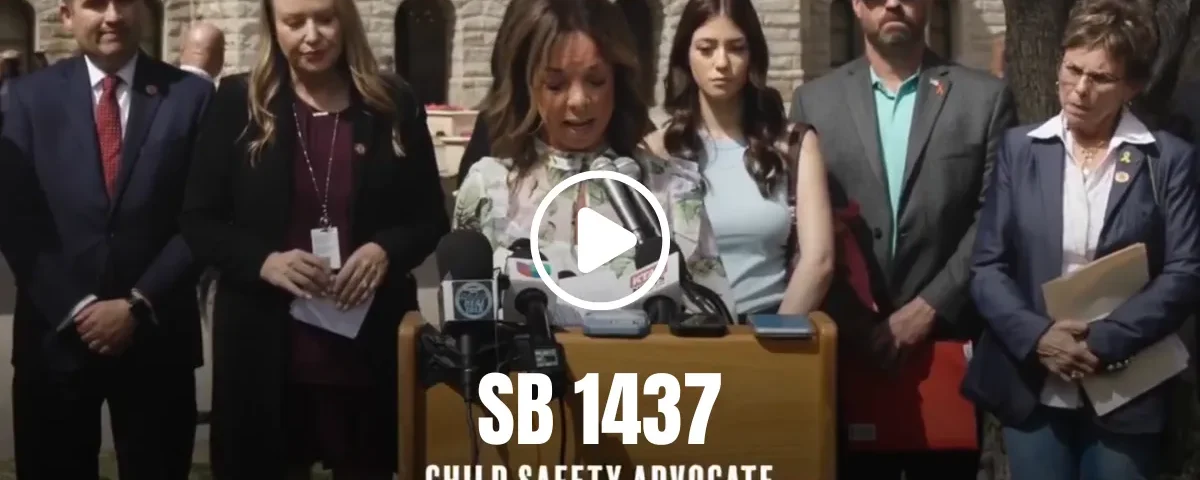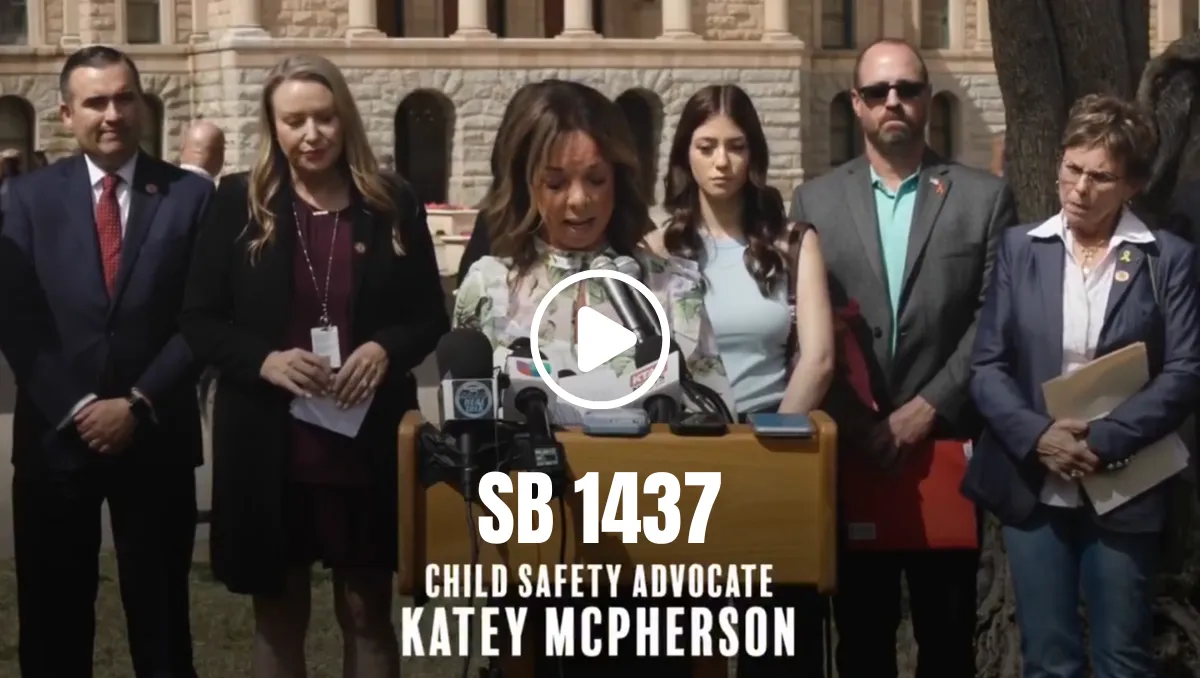
Why Waiting Matters: My Take on Smartphones, Kids, and Mental Health
August 1, 2025
California AB 495 Raises Alarms Over Parental Rights and Safety
August 16, 2025They Knew. They Didn't Report. That Ends Now.
What would you do if you found out your child's school knew about a predator — and said nothing?
That's not a hypothetical. It's happened. In Arizona. In 2025. In your district or one next door.
For years, school officials, board members, and even campus cops had ways to bury reports of abuse, sidestep the law, or just flat-out ignore red flags. But not anymore.
Thanks to Arizona Senate Bill 1437, sponsored by Senator Carine Werner, parents finally have the protection and clarity they deserve. It's not just a win — it's a long-overdue correction to a system that has failed children for far too long.
And the best part? It passed with unanimous support.
Let's break down what this law does, why it matters, and how people like Katey McPherson, a mom of four and national digital safety advocate, are leading the charge to make sure it sticks.
What SB 1437 Actually Does — And Why It Matters
Passed in April 2025, SB 1437 closes loopholes that previously let some school officials off the hook when it came to reporting child abuse, sexual misconduct, and exploitation on campus.
Here's what the law changes:
1. Expands the List of Mandatory Reporters
Previously, only full-time teachers and certain staff were required to report suspected abuse. Now, that list includes:
- School board members
- Charter board members
- Substitute teachers
- School safety officers
- Resource officers
Why does that matter? In multiple real cases, these roles witnessed or became aware of misconduct and said nothing. Now, silence is illegal.
"If you're in a position of authority around kids, you don't get to look the other way," — Sen. Carine Werner (AZSenateRepublicans)
2. Eliminates the "I Told My Boss" Excuse
Too many school employees believed they fulfilled their duty by telling a principal or their school's SRO (school resource officer).
SB 1437 makes it crystal clear: you must report directly to law enforcement and the Department of Child Safety (DCS). Period.
If you don't? You could face criminal consequences.
3. Trained Professionals Handle Interviews
No more "internal investigations" by untrained administrators. When a student reports abuse:
- Only trained forensic interviewers may speak with the child
- School officials must alert police and DCS immediately
- The State Board of Education must be notified within 3 business days if the accused works in a school
This stops the common practice of schools trying to "quietly handle" serious accusations in-house.
4. Whistleblower Protections
Staff who report abuse in good faith are protected from retaliation. They can't be fired, demoted, or intimidated for doing the right thing.
Why Was SB 1437 Necessary? The System Was Broken.
Too often, Arizona parents found out the hard way that schools could sit on abuse reports, delay action, or fail to alert police.
Need examples? Let's talk recent headlines:
Phoenix High School Teacher Arrested
In April 2025, a baseball coach at Cortez High School was arrested for sexually exploiting students and filming the acts — some of it on school property (AZFamily).
The school knew. And yet, delays in reporting allowed the behavior to continue.
Mesa College Instructor Under Fire
In May 2025, a drama teacher at Mesa Community College reportedly forced students to undress on stage as part of a "trust" exercise. The incident sparked immediate outrage and triggered internal reviews (People).
Critics questioned why this kind of thing was happening in a state with strong mandatory reporting laws.
The answer? They weren't strong enough until now.
My Perspective as a Mom, Educator, and Advocate
As a former school administrator and someone who's worked in Arizona education for over two decades, I've seen firsthand how broken our reporting systems have been.
As a mom of four daughters, I've also seen how often kids speak up—and are ignored.
SB 1437 changes that. It removes ambiguity. It closes dangerous loopholes. It says loud and clear: if you work in a school, you are responsible for protecting the kids in your care.
No more "I told my boss" excuses. No more quiet cover-ups. No more internal handling.
If a child reports abuse, we now have a process backed by law—not just policy—and that means safety isn't left to chance.
Unfortunately, there are districts within our state that have developed a complicit and shameful culture that has allowed them to ignore, circumvent, or even exploit weaknesses in the current statute. This law confronts that culture head-on. It sets a new standard: one rooted in accountability and moral responsibility.
I've worked with families who didn't find out until months later that something happened on campus. In some cases, their child did speak up… but the message didn't go beyond a teacher or school cop. That's what SB 1437 fixes.
I support this law fully, and I'm proud of the parents, lawmakers, and prosecutors who made it happen.
To educators who worry about false allegations: this protects you, too. This law ensures trained forensic interviewers—not principals, not office staff—handle allegations professionally and privately. That protects everyone involved and gives due process the respect it deserves.
This law creates a culture shift.
- It encourages collaboration between schools and families
- It prioritizes student well-being over institutional reputation
- And it sends a clear message to anyone with bad intentions: you are not welcome in Arizona schools
A Bipartisan Victory Worth Celebrating
While I strongly believe in parental rights, transparency, and accountability—values often emphasized by conservatives—I also think this is bigger than politics.
SB 1437 passed with unanimous bipartisan support. And that's precisely how it should be.
Protecting children from sexual abuse and institutional neglect isn't a left-right issue. It's a human one. Parents from all walks of life can—and should—stand behind stronger protections like this.
I'm grateful to Senator Carine Werner for introducing this bill and to Governor Katie Hobbs for signing it. When leaders on both sides come together for the good of our children, we all win.
What Happens Now? Enforcement and Culture Shift
Passing a law is one thing. Making it work is another.
Here's what needs to happen next:
- Mandatory training for every new mandatory reporter
- Clear signage in schools outlining reporting steps
- Parent engagement to ensure families understand their rights
- Watchdog follow-through to make sure districts comply
If a district fails to act under SB 1437, they should be called out. Loudly.
This law only works if we enforce it—and parents stay involved.
Final Thoughts: Protecting Kids Isn't Partisan. It's Moral.
Arizona SB 1437 isn't about politics. It's about protection. And it's about time.
For too long, predators were able to slip through cracks in the law—thanks to confusion, loopholes, or bureaucratic cowardice.
Now, we have a law that fixes that. It doesn't coddle institutions. It prioritizes children.
And if that makes some school boards nervous? Good. That means it's working.
"I'm proud of Arizona for taking this stand. This law isn't just good—it's necessary." — Katey McPherson.
Let's make sure every state follows our lead.
Sources:
- Arizona SB 1437 Legislative Summary
- AZ Family News
- People Magazine
- Maricopa County Attorney's Office
- AZ Senate Republicans @AZSenateGOP
- KateyMcPherson.com



